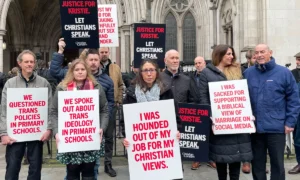Federal Layoffs Shake Christians in Government: Understanding the Impact and Implications
Introduction: The Landscape of Federal Employment for Christians
The federal workforce in the United States is a diverse entity, encompassing individuals from various backgrounds, cultures, and belief systems. Within this mix, Christians hold a significant representation, contributing their faith-based perspectives to the public service sector. It is essential to understand the historical context of Christian employment within federal agencies to appreciate the role they play in shaping policy and decision-making in government.
Throughout American history, Christians have been integral in the development of federal policies that reflect moral and ethical values aligned with their beliefs. This participation has fostered a sense of commitment to public service, where individuals aspire to serve their communities and uphold values they believe are beneficial for society. Historically, Christians have been visible in multiple roles, from administrative positions to high-ranking officials, thereby ensuring that a faith-based perspective is part of the government discourse.
In recent years, the dynamics of federal employment have faced challenges due to various economic pressures, notably economic downturns, budgetary constraints, and shifts in political priorities. Such challenges have culminated in apprehensive discussions surrounding layoffs, particularly those affecting Christians in government roles. These layoffs not only threaten the livelihood of individual employees but also evoke broader concerns regarding the representation of faith in government. The apprehension stems from a fear that the removal of Christian voices could inhibit the infusion of deeply held ethical values into policymaking.
The significance of representation within the federal workforce cannot be overstated, as it piecemeals the narrative through which policies are viewed and implemented. It promotes a balance of perspectives that are essential for effective governance. Thus, the recent federal layoffs present a critical juncture for Christians in government, raising questions about their future roles and the potential implications for faith-based perspectives in public service.
Overview of Recent Federal Layoffs
In recent months, the federal government has undergone significant layoffs, affecting numerous employees across various agencies. As of October 2023, reports indicate that approximately 12,000 federal jobs have been eliminated, marking an unprecedented shift in the workforce landscape. Agencies such as the Department of Defense, Department of Agriculture, and the Environmental Protection Agency have been particularly impacted. These layoffs have arisen amidst budgetary constraints and a growing call for efficiency within federal operations, leading to difficult decisions regarding personnel.
The economic backdrop of these layoffs can be traced to broader factors, including inflationary pressures, which have strained government budgets. Policymakers have been compelled to reassess fiscal priorities, ultimately leading to cuts in several areas deemed non-essential. Additionally, a shift towards digital services and artificial intelligence has prompted a reevaluation of skill sets required in government roles, resulting in the displacement of employees whose skills may no longer align with new technological initiatives.
The demographic analysis of those affected reveals notable patterns among Christian employees within federal agencies. Many workers in these positions often participate in faith-based community actions and advocacy. However, with the recent job cuts, there has been a discernible increase in concern among this group, as these layoffs may disproportionately affect their representation in government roles. The implications of such layoffs extend beyond individual losses; they may influence the fabric of the workforce in a broader sense, emphasizing the importance of diversity and representation in public service.
As the situation develops, it will be essential to monitor not only the immediate outcomes for the laid-off workers but also the long-term ramifications for the federal government’s approach to employment and staffing, particularly concerning its Christian employee base.
The Emotional and Spiritual Toll on Affected Employees
The recent federal layoffs have profoundly impacted many employees, particularly those who identify as Christians within the government sector. The abrupt severance from their positions often leads to a cascade of emotional challenges, including uncertainty, anxiety, and feelings of loss. For these individuals, being part of a government organization often aligns with their spiritual calling to serve and contribute positively to society. Therefore, when layoffs occur, it raises not only professional concerns but also spiritual and emotional turmoil.
Many affected employees experience a sense of disorientation, struggling to reconcile their faith with the sudden shift that threatens their stability. The emotional toll can induce feelings of inadequacy; they may question their contributions and whether they are fulfilling their divine purpose. Undoubtedly, this uncertainty can lead to anxiety about their future, affecting their mental health and overall well-being. Some individuals have voiced their fears of societal judgment or inadequacy due to job loss, leading them to experience heightened stress and isolation.
Moreover, personal stories from those affected illustrate the multifaceted impact of these layoffs. For example, one former employee recounted how their faith played a pivotal role in navigating the emotional aftermath of job loss. They found solace in prayer and community, helping them rebuild a sense of purpose and direction. Such narratives highlight the importance of support systems, such as faith-based communities, which offer solace, understanding, and encouragement during challenging times.
In these circumstances, affected employees often seek out both spiritual guidance and local support networks to help process the emotional fallout. Accessing counseling services and participating in group discussions can provide necessary outlets for healing, reaffirming their faith even when faced with adversity. By nurturing their emotional and spiritual well-being, employees can begin to regain a sense of hope and purpose in the aftermath of layoffs.
Community Reactions: Support from Churches and Organizations
In light of recent federal layoffs, Christian communities, churches, and organizations are rising to the occasion, providing essential support to those affected. As unemployment rates increase, these faith-based groups have amplified their outreach efforts, offering a variety of resources to aid individuals transitioning through this challenging period. Many churches have established job placement services to help members navigate the job market, where opportunities may be scarce due to the economic climate.
In addition to practical assistance, spiritual support remains a fundamental aspect of the outreach process. Churches across the nation are organizing counseling services, led by trained professionals and volunteers, to address the emotional turmoil that layoffs can create. Such services often include one-on-one counseling sessions and group workshops that focus on resilience and coping strategies, helping individuals regain a sense of stability during uncertain times.
Moreover, the Christian community is fostering a sense of solidarity through prayer support and community discussions. Prayer meetings specifically dedicated to those impacted by the layoffs have become common, providing a space for individuals to share their concerns and seek encouragement from their fellow congregants. Many organizations are encouraging open dialogues about the intersection of faith and work, highlighting how belief can play a crucial role in navigating career challenges.
Additionally, community solidarity events, such as fundraisers and workshops, are being organized to enhance connections among individuals facing similar hardships. These events aim to instill hope, promote resilience, and encourage networking among participants. By uniting their efforts, Christian communities are not only supporting those affected by federal layoffs but also reinforcing their collective identity as a source of strength and hope in these trying times.
Navigating Faith and Employment in a Turbulent Climate
The recent wave of federal layoffs has left many individuals grappling with the intersection of their faith and employment. For Christians in government, maintaining core values amid such upheaval can present unique challenges. Although these layoffs are often driven by economic factors, the implications extend far beyond mere employment statistics. They can deeply affect personal identity, sense of purpose, and spiritual well-being.
In uncertain times, perseverance becomes a crucial virtue. Many Christians derive strength from their faith, viewing challenges as opportunities for growth and testing of character. This situation is no different; individuals can find solace in biblical narratives that emphasize resilience and adaptability. The story of Job, for instance, resonates strongly as it illustrates unwavering faith amidst overwhelming adversity. Such narratives provide a foundation that encourages believers to stay the course despite external circumstances.
Furthermore, adaptability is paramount in times of turbulence. The ability to pivot one’s career focus, explore new vocational avenues, and remain open to unexpected opportunities can foster a renewed sense of hope. Christians are called to be active participants in their communities, and utilizing faith-based initiatives can pave the way for networking and support. Engaging in fellowship with others provides not just moral support but also practical advice and shared experiences that can help navigate these difficult waters.
Ultimately, it is essential for Christians facing these challenging circumstances to ground their decisions in their faith. Prayer, meditation, and community engagement can offer guidance and reassurance. By leaning on their beliefs and staying connected with others who share similar values, individuals can cultivate a sense of stability. In their journey, they can emerge stronger, confident that their faith is an anchor, even amidst the unpredictable nature of federal employment challenges.
Advocacy and Policy Implications for Christians in Government
The recent federal layoffs have reverberated through various sectors, particularly affecting the Christian community within government positions. Such drastic employment shifts not only threaten job security but can also diminish the presence of faith-based perspectives within public policy. The implications for Christians in government extend beyond individual job loss, highlighting the necessity for advocacy efforts aimed at safeguarding religious expression in the workplace.
One of the primary concerns stemming from the layoffs is the potential erosion of religious freedoms within government roles. Advocacy groups representing Christians in public service are increasingly vocal about the significance of maintaining a workspace that honors diverse beliefs. These entities argue for policies that promote the protection of religious expression, ensuring that governmental actions do not infringe upon the rights of faith-based employees. This includes lobbying for clearer guidelines that defend the religious rights of individuals in the public sector, preventing discrimination based on one’s faith or beliefs.
Additionally, the layoffs prompt a call for systemic reforms aimed at enhancing job security for faith-based employees. Legislative measures could be explored to create more comprehensive protections for these workers, dispelling fears of future workforce reductions based solely on religious affiliation. Policymakers are urged to consider framework modifications that prioritize not only transparency in layoff processes but also equitable treatment of all employees, regardless of their faith.
Through sustained advocacy and constructive dialogue, the Christian community in government can galvanize efforts to address these challenges. By fostering an environment that respects and upholds religious expression, it is possible to counterbalance the adverse effects of layoffs and advocate for a future where faith-based individuals can thrive in their public service roles.
Resilience and Recovery: Moving Forward After Layoffs
The impact of federal layoffs can be profound, particularly for Christians in government roles who may face added emotional and spiritual challenges during this turbulent time. However, navigating the complex path to resilience and recovery can lead to new opportunities for personal growth and professional advancement. The key is to approach this transitional period with a proactive mindset and a willingness to adapt.
First and foremost, job searching becomes essential in the aftermath of layoffs. It is advisable for individuals to update their resumes and tailor them to reflect relevant skills and experiences that match potential job opportunities. Utilizing online job boards, company websites, and government employment resources can help broaden the search. Resources such as local employment offices or churches that offer career assistance can also provide invaluable support.
Networking plays a vital role in finding new employment. Engaging with former colleagues, friends, and family can open doors to job leads that may not be widely advertised. Attending industry conferences, community events, or faith-based gatherings can foster new connections and facilitate the exchange of valuable information. Utilizing platforms such as LinkedIn to connect with fellow professionals can also be instrumental in discovering job openings and staying informed about industry trends.
Enhancing marketable skills should also be a focus during this transition. Consider enrolling in workshops, online courses, or professional development programs that align with career objectives. These efforts can significantly improve one’s employability, demonstrating adaptability in a competitive job market. Additionally, pursuing certifications relevant to one’s field can bolster a resume and attract potential employers.
Amidst the search for new roles, it is crucial to maintain hope and support one another. Building a community of individuals who share similar experiences can foster resilience and encouragement. By offering and receiving support, those affected by layoffs can navigate this challenging period more effectively, ultimately paving the way towards a brighter future.
Success Stories: Christians Who Overcame Layoff Challenges
In a world where job security often seems elusive, numerous Christians have faced the daunting challenge of layoffs yet emerged stronger and more determined in their careers. These inspiring narratives highlight the resilience, faith, and perseverance that many individuals draw upon during difficult times. One notable example is Sarah, a government employee who spent over a decade in a federal agency. When she received the news of her layoff, she was initially overwhelmed with uncertainty. However, she used this setback as an opportunity to pivot her career. By leveraging her professional network and engaging in additional training, Sarah transitioned to a role in the non-profit sector, focusing on community development. Her story exemplifies how challenges can often lead to new and fulfilling paths.
Similarly, Daniel, a policy analyst, experienced a layoff but chose to face the situation head-on. Rather than succumbing to despair, he began volunteering with local organizations, which not only provided support to those in need but also helped him to refine his skills and expand his connections. His proactive approach ultimately led to a new position in a reputable think tank, furthering his career in public policy. Daniel’s journey underscores the importance of staying actively engaged and utilizing available resources to create positive outcomes.
These stories of Sarah and Daniel, among many others, reflect how faith plays a crucial role in navigating professional upheavals. Many individuals find solace in their beliefs, which provide guidance and encouragement during tumultuous times. Through their dedication and determination, they have not only overcome the immediate challenges posed by layoffs but have also found renewed purpose in their professional endeavors. Their experiences serve as a beacon of hope for those still grappling with job loss, illustrating that resilience and resourcefulness can lead to unexpected and fulfilling opportunities.
Conclusion: Reflections on Faith, Work, and Community
The recent federal layoffs have undeniably stirred significant emotions and concerns among Christians working in government roles. As we reflect on the interplay between faith and work, it becomes apparent that one’s spiritual beliefs can provide profound strength during turbulent times. Many employees find their faith is not merely a private matter but is woven into the very fabric of their professional lives. This intrinsic connection fosters resilience, allowing individuals to face challenges with a sense of purpose and hope.
Moreover, the essence of community support cannot be overstated. In times of distress, communities of faith rally together, offering emotional and tangible assistance to those facing job insecurity and uncertainty. This collective strength is an essential lifeline for individuals affected by recent upheavals. Sharing experiences and resources amplifies the message that they are not alone in their struggles, reinforcing fellowship and connection amid adversity.
As we conclude our discussion, it is imperative to recognize the importance of ongoing awareness regarding the unique challenges faced by Christians in the federal workforce. Advocacy for their rights and concerns must be paramount as changes occur within governmental structures. By promoting a supportive and inclusive environment, we can help ensure that their contributions to public service are recognized and valued.
Ultimately, drawing upon faith and community resources is vital as Christians navigate the uncertainties that arise within their professional landscapes. Let us embrace a commitment to support one another, fostering an atmosphere where both work and faith can thrive harmoniously, even in the face of trials. The call to action extends beyond individual circumstances, encouraging a collective effort to create spaces of solidarity and understanding for all who serve in government roles.












Leave a Reply
You must be logged in to post a comment.